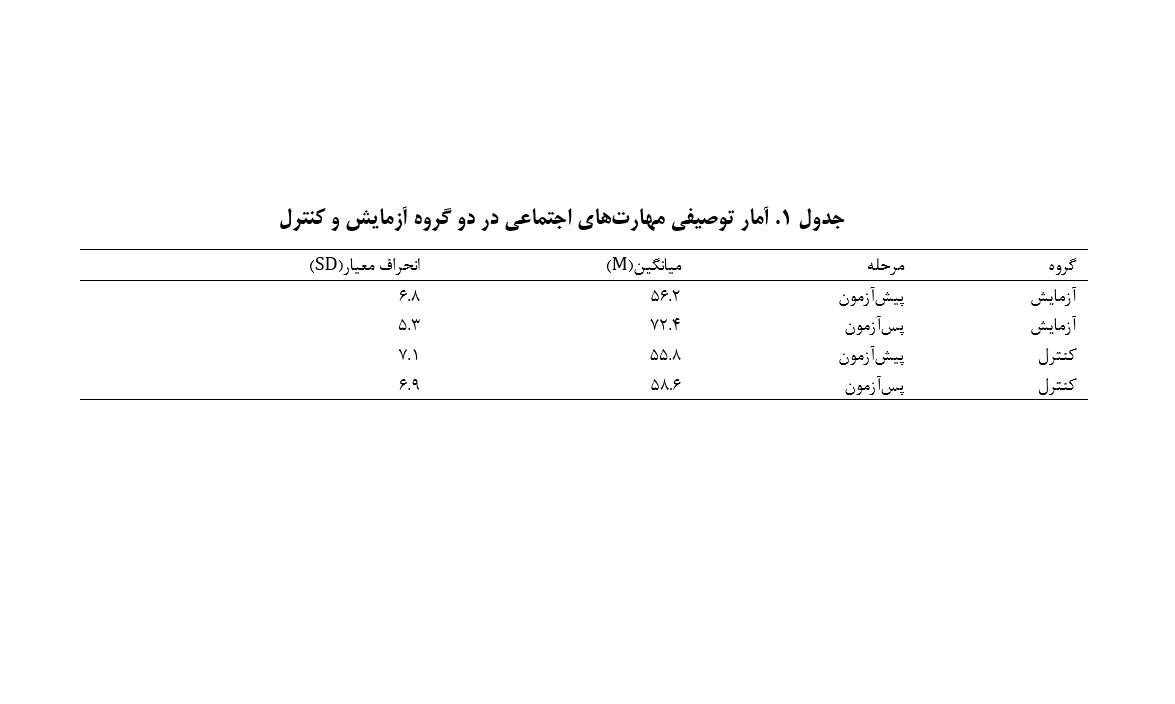تاثیر بکارگیری اسباب بازی های فکری و جمعی در ارتقاء مهارت های اجتماعی کودکان
کلمات کلیدی:
مهارت های , اجتماعی, اسباب , بازی , های , فکری, گروهی, رشد , کودک, یادگیری , مشارکتیچکیده
این پژوهش با هدف بررسی تأثیر اسباببازیهای فکری و جمعی بر ارتقای مهارتهای اجتماعی کودکان ۶ تا ۱۰ ساله انجام شد. این مطالعه به روش نیمهتجربی با طرح پیشآزمون-پسآزمون و گروه کنترل انجام شد. نمونه پژوهش شامل ۱۲۰ کودک (۶۰ پسر و ۶۰ دختر) بود که بهصورت تصادفی از چهار مدرسه در تهران انتخاب شدند و به دو گروه آزمایش و کنترل تقسیم گردیدند. ابزار گردآوری دادهها شامل پرسشنامه استاندارد مهارتهای اجتماعی (SSRS) و چکلیست مشاهده رفتارهای تعاملی بود. گروه آزمایش طی ۱۲ جلسه ۴۵ دقیقهای در فعالیتهای ساختاریافته با اسباببازیهای فکری و جمعی شرکت کردند، درحالیکه گروه کنترل درگیر بازیهای غیرساختاریافته رایج شدند. دادهها با استفاده از تحلیل کوواریانس (ANCOVA) و تحلیل تم برای دادههای کیفی، در نرمافزار SPSS نسخه ۲۶ تجزیهوتحلیل شد. میانگین نمرات مهارتهای اجتماعی در گروه آزمایش از 56.2 (انحراف معیار: 6.8) در پیشآزمون به 72.4 (انحراف معیار: 5.3) در پسآزمون افزایش یافت، درحالیکه در گروه کنترل تغییرات ناچیزی مشاهده شد (55.8 به 58.6). نتایج تحلیل کوواریانس نشان داد که تأثیر مداخله معنادار بود (F = 34.7, p < 0.001, η² = 0.42)، که بیانگر اندازه اثر بالا در بهبود مهارتهای اجتماعی کودکان است. اسباببازیهای فکری و جمعی میتوانند بهعنوان ابزاری مؤثر برای بهبود مهارتهای اجتماعی کودکان مورداستفاده قرار گیرند. یافتههای این پژوهش اهمیت طراحی برنامههای آموزشی مبتنی بر بازیهای گروهی را برجسته کرده و پیشنهاد میکند که این ابزارها در محیطهای آموزشی و خانوادگی بهطور گستردهتری به کار گرفته شوند.
دانلودها
مراجع
Evans GW. The physical context of child development. Current Directions in Psychological Science. 2021;30(1):41-
doi: 10.1177/0963721420980719.
Kurnia D, Jarwo S, Friskawati GF. Free play is important for children's motor development, but how we can supervise
it?: A phenomenological study at early childhood education. Retos: nuevas tendencias en educación física, deporte y recreación.
(58):256-64. doi: 10.47197/retos.v58.104099.
Giddings S. Toy Theory: Technology and Imagination in Play: MIT Press; 2024.
Chinwe DL. Imperativeness of Toy Making for Cognitive Development in Early Childhood Care and Education for
Sustainable Development in Nigeria. Journal of Education in Developing Areas. 2023;31(2):130-40.
Badami, Moghaddadi, Pilevar. The Role of Legal Protections for Children in Cyberspace with Emphasis on the Right
to Religious Education. Legal Studies. 2022;21(50):457-94.
Barimani S, Asadi J, Khajavand. The Effectiveness of Play Therapy on Social Adaptation and Communication Skills
in Deaf Children. Rehabilitation Archives Quarterly. 2018;19(3):250-61. doi: 10.32598/rj.19.3.250.
Boghian I, Cojocariu VM. Using games to build social emotional learning skills. Revista Romaneasca pentru Educatie
Multidimensionala. 2023;15(1):622-56. doi: 10.18662/rrem/15.1/715.
Irshad S, Maan MF, Batool H, Hanif A. Vygotsky's Zone of Proximal Development (ZPD): An evaluative tool for
language learning and social development in early childhood education. Multicultural Education. 2021;7(6):234-42.
Garaigordobil M, Berrueco L, Celume MP. Developing children's creativity and social-emotional competencies
through play: Summary of twenty years of findings of the evidence-based interventions "game program". Journal of
Intelligence. 2022;10(4):77. doi: 10.3390/jintelligence10040077.
Shoshani A, Krauskopf M. The Fortnite social paradox: The effects of violent-cooperative multi-player video games
on children's basic psychological needs and prosocial behavior. Computers in Human Behavior. 2021;116:106641. doi:
1016/j.chb.2020.106641.
Malakouti N, Mohseni A, Farid S. Community-Based Prevention of Juvenile Delinquency in Virtual Educational
Environments (With Emphasis on Criminological Findings). Judicial Law Perspectives Quarterly. 2023;28(102):207-34.
Eimer T, Aleksić G, Zhang Q. The Role of LEGO in Numeracy Development: A Case Analysis. Social Ecology of a
Chinese Kindergarten: Where culture grows2020. p. 93-109.
Chen J, Yang S, Mei B. Towards the sustainable development of digital educational games for primary school students
in China. Sustainability. 2021;13(14):7919. doi: 10.3390/su13147919.
Rahbar V, Heydari. The Impact of Social Capital on the Advancement of Policy-Making. Quarterly Journal of
International Relations Studies. 2011;4(14):219-53.

دانلود
چاپ شده
ارسال
بازنگری
پذیرش
شماره
نوع مقاله
مجوز
حق نشر 2025 نشریه پژوهش و نوآوری در تربیت و توسعه

این پروژه تحت مجوز بین المللی Creative Commons Attribution-NonCommercial 4.0 می باشد.










